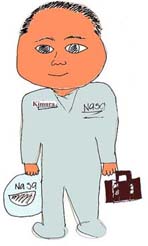







 |
 |
 |
 |
 |
 |
 |
 |
Interview
Our website isn't complete without an interview, so we E-mailed Mr. Art Kimura. We knew he was the right man to interview because he is director of the Future Flight Hawaii program located at University of Hawaii.
Question #1: Do you think humans can
survive on Mars? Why /why not?"
Answer: "From what I have read and learned, it is possible and probable that human beings will live on Mars one day. Due to the unique environment, however (low air pressure, carbon dioxide in the atmosphere, no ozone layer, very cold temperatures), there will have to be adaptations such as spacesuits of some kind in order to protect the colonists from the harsh environment. Inside the habitats, however, it will be in some ways like living on Earth...adequate air pressure, oxygen to breathe, etc....except for the lower gravity.
We went to the moon and survived for a few days there...Mars is an even better environment for human settlement one day...at least there is some air pressure...the challenge is to find water that can be used...we know that there was lots of water on Mars in ancient past...what happened to it?
Is it trapped in? I think as you do more research, you will find that the environment and its challenges can be overcome through human creativity and technology. It is even thought by some that one day we can warm up the planet and "green" the planet Mars."
Question #2: Do you think there are life forms on Mars and if so what types?"
Answer:. "Regarding your life question, based on current data (which does not include actual sample returns from Mars ... other than meteorites whose origin is determined to be from Mars), there is conclusive evidence of current life on Mars...if there is life there, life is probably in the form of microscopic bacteria like organisms, perhaps living in colonies.
With the lack of an ozone layer, the ultraviolet radiation at the surface of Mars which is many times more than on Earth would make life at the surface prohibitive. However, there may be life under the surface. If we think of life as based on carbon as Earth's life is, then there probably is a need for a water source...again the speculation is that there is permafrost under the soil...the Mars 98 mission has two projectiles which will penetrate the surface and seek water. Based on data on Earth...and expanding research, life as we know it can live in very extreme environments...from hot lava vents (organism even existing on energy from sulfur and not dependent on photosynthesis) to the cold antarctic areas.
The Viking missions of 20+ years ago returned data that was controversial...there appeared to be changes in nutrient broth that was on the spacecraft...question was: was it a mere chemical change or the result of living things interacting with it? I suspect that we will not find out the answer to your question until human beings actually go there and collect samples from many different areas of Mars. I look at it as if aliens were checking to see if life existed here on Earth through robotic spacecraft sampling...if it landed in the middle of a desolate desert or in the middle of a large parking lot, would their data indicate life? I think that it is exciting that your generation of scientists, perhaps even you, are going to be able to answer your question in the 21st century."
Question #3"What do you think are the two factors that would make colonizing on Mars impossible?"
Answer: "As for what 2 factors will make colonizing Mars impossible: simply put...national or international will (which includes leadership of a visionary and dynamic level) and the economy (and lack of it...or will we be able to justify the cost of colonizing Mars besides the scientific value of the exploration); we have the technology already to send people to Mars...the cost is rather high so an international effort will have to be started. U.S. current vision includes a human landing in the early part of the 21st century...hopefully it will happen. If you are interested in how we can go to Mars, check out books written by Dr. Robert Zubrin, one of the leading proponents of sending humans there within 10 years."
Question #4: "We read somewhere in a book that if humans were to survive on Mars, and if we were to live on Mars without any protection our eyes be sucked out. Is that true?"
Answer : "No, our eyes would not be sucked out of our head, but our features would surely be distorted because of the very low air pressure."
 |
| Acknowledgments | Authors | Just for Teachers | | Message Board | Guestbook | E-mail Us Take Our Mars Madness Poll |
|